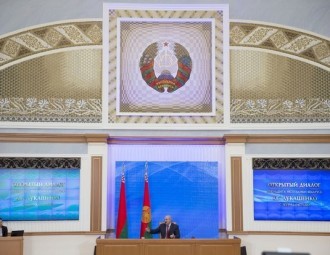Zmicier Lukashuk: Lukashenka isn’t 100% sure that no Russian “green men” will appear in Belarus
 photo by Reuters
photo by Reuters
Skeptically repeated Lukashenka’s words about “this Russian world that they are pushing here” give hopes that he understands the threat to Belarusan independence that Russia is posing.
Lukashenka’s press conference on February 29 broke the boldest forecasts: the event lasted as long as 7 hours. Not all the journalists were able to stand the high-strung tension: one of the regional journalists found himself in an ambulance car instead of Lukashenka’s meeting.
All in all, 260 journalists from newspapers (142 of whom came from the regions), 16 information agencies, 3 Internet editions, 26 TV-channels, and 41 radio stations were invited to the event.
Zmicier Lukashuk, a participant of the press conference, a journalist of Euroradio, shred his impressions from the press conference with “EuroBelarus” Information Service.
- How did the participants bear a seven-hour marathon without leaving the hall? Were there any emergencies?
- On the eve of the conference a debate on how many hours the conference will last started in Facebook. We weren’t bored; Lukashenka is a good showman. Except for one situation, when an ambulance took one man from the regions felt unwell even before the conference started.
- How did the membership of the participants change if compared with the previous year? Previously, only official media and certain representatives of independent media were allowed to take part in the press conference, whereas this year even the earlier ignored Internet media were invited.
- I was present only at one meeting, so it is hard for me to compare: the press conference on December 20, 2010, two days after the president election and Ploshcha 2010, was very different from a working meeting; if in 2010 everything was tense, this time the meeting went relaxed, calmly, and with jokes.
As to the composition of the conferences we all observed on TV, I don’t think that it changed a lot: state media, regional editions, non-state media, and foreign media formed the core without any particular division. All of them were registered media.
- You didn’t feel any discrimination by Lukashenka against non-state media?
- No, there was no difference. As far as I understood, first ten questions and first ten speakers were agreed on. A journalist from a state-media said that despite the approved question he would still ask it in his own wording. No one was questioning journalists as to what they are going to ask.
- Did you hear anything new for you? Many people say that there was no sense to sit in the hall for 7 hours, as Lukashenka didn’t say anything new.
- There are questions the answers to which were obvious; on the other hand, even if we know what Lukashenka’s answer will be there are questions that are impossible to ignore; and, first of all, the question about political prisoners.
We agreed with our “non-honest” colleagues as to who would like to ask which questions so that there would be no overlapping and so that we would be able to cover a bigger spectrum of problems.
There are questions caused by new events and new times, so we had to go in order to hear Lukashenka’s opinion or ask him a question head-on. We had to ask about new threats for Belarusan independence that Russia is posing.
Most questions and answers could be predicted; but there was some reason for attending this press conference.
- Were journalists satisfied with the answers to the questions about new threats for Belarus from Russia?
- Mostly yes, I think. Lukashenka was saying that there would be no conflict with Russia, that he doesn’t believe in that; that we are brotherly nations, etc. On the other hand, he was returning to this topic, saying that we will suppress these Black Hundreds, Russophobes. And skeptically repeated Lukashenka’s words about “this Russian world that they are pushing here” give hopes that he understands the threat.
- What questions asked at the press conference you would mark off?
- I would mark two speakers: the editor of the “Narodnaja volia” Siaredzich; not even his questions, but his indignation and swordplay with Ananich (The Information Minister – EuroBelarus), and his speech in general. When in the end Lukashenka allowed to ask him “uncomfortable questions”, Tatsiana Melnichuk said that to arrest those who stood with a poster “Je suis Charlie” or those who took flowers to Shevchenko’s monument is a demonstration of weakness. These were the two strongest moments of this event.
- Did you have a possibility to ask all your questions and were you satisfied with Lukashenka’s answers?
- Of course, I didn’t ask all my questions. Anyway, I managed to squeeze three topics in one question and get answers to them.
I cannot say about satisfaction or dissatisfaction as Lukashenka cunningly avoided answering the question about retiring on presidential pension. Lukashenka promised that in 2050 Belarusan nation won’t ask him to run for presidency; on the other hand, “how can I not to, if the people ask?..”
We all agree that the war is going on in Ukraine. But who is leading this war? I would like to hear that this is the war between Russia and Ukraine, not some civil war in Ukraine as shown by Russian media. But Lukashenka didn’t voice that. Though after my remark that “intelligence services report to you whose weapons and equipment are fighting in Ukraine and where does it come from” Lukashenka smiled slyly and understandingly and nodded, as if saying that he knows who stands behind this…
When you have a full-fledged interview you have a possibility to ask qualifying questions that will somehow make a person answer; however, there was no such opportunity, so not all the questions were answered.
-
03.01
-
07.10
-
22.09
-
17.08
-
12.08
-
30.09








































